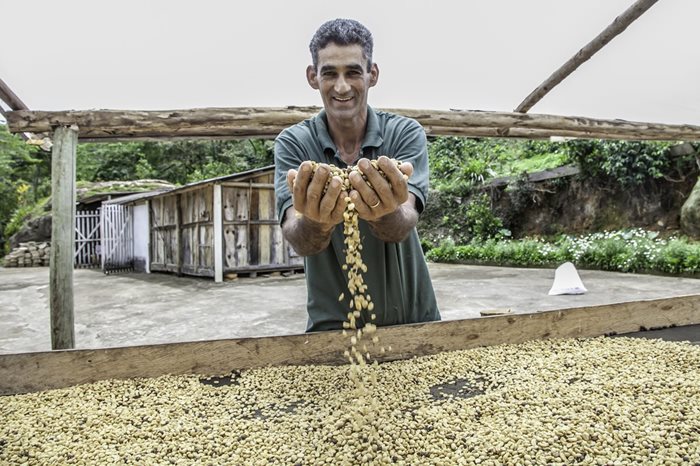With Brazil’s domestic specialty coffee market expected to reach $1bn (R$3.9bn) by 2020, Marcos Racy Haddad & Mariana Proença explore the lucrative connections being forged between producers, specialty coffee shops and consumers across the vast South American nation
.jpg.aspx?lang=en-GB&width=700&height=393)
A Brazilian coffee plantation. Credit: Vitor Barao
The world’s largest coffee growing nation is forecast to produce a record 3.8 million-ton crop in 2018-19, but until recently Brazil had focused on commodity coffee production. Domestic specialty coffee consumption in Brazil may be a fraction of total production, around 490,000 60kg bags, yet this is forecast to more than double by 2020.
With modern brewing methods such as drip machines becoming more common in Brazilian households over the last decade, specialty coffee has become an increasingly relevant and lucrative crop. According to the latest Brazilian Coffee Industry Association (ABIC) survey, specialty coffee represented 12% of total coffee retail sales in 2018. Meanwhile, the number of coffee shops in the country has increased 3.2% over 12 months. Indeed, the retail value of Brazil’s specialty coffee market is expected to reach $1bn (R$3.9bn) by 2020.
Sensing an opportunity, many Brazilian producers have increased the proportion of their crop dedicated to specialty micro lots, adding value to the domestic market in the process. However, if you want to play the specialty coffee shop game in Brazil, today it is mandatory for all single origin coffees to carry details of the farmer, farm and location.
Serving seasonal and rare coffees is also preferable, as are lots from the winners of various quality competitions from across the country.
Coffee competitions are among the most effective accelerators of specialty coffee in Brazil, with several events helping to bring previously obscure regions into the limelight. Located on the border of Minas Gerais and Espírito Santo states, the Caparaó region has long been overlooked by coffee exporters and consumers, despite being home to some true hidden treasures.

Afonso Lacerda, 2018 Coffee of the Year winner | Credit: Bruno Lavorato
Since the victory of Clayton Barrossa Monteiro (
Fazenda Ninho da Águia) at the Coffee of the Year contest during Brazil International Coffee Week in 2014 and 2015, the Caparaó region has become a highly sought-after origin for tourists. Dozens of high-quality producers have since emerged in the market, such as 2018 Coffee of the Year winner, Afonso Lacerda, who hails from Belo Horizonte.
Today, Caparaó is the most favoured coffee producing region among cafés in São Paulo and Brasília, two of the key cities in the Brazilian coffee scene. But these beans are not restricted to the domestic market; esteemed international cafés, such as The Barn in Berlin and Coutume in Paris have brought Caparaó coffee to the world stage.
Brazil’s global coffee reputation is also promoted by the
Cafés do Brasil programme, which ensures every 60kg bag exported is correctly labelled with the regional origin. Brazil has more than 25 origins, most of them pursuing the ‘Geographical Indication’ seal. The work of local government in these producing regions has proven fruitful for many farmers, especially when facilitating opportunities for them to trade directly with roasters and coffee shops internationally. These are important initiatives for a country like Brazil as they unite two significant ends of the coffee supply chain: producers and consumers.
Experiencing Brazilian coffee
Brazilian coffee shop consumers are increasingly eager to learn about the origin of their coffee, a trend reflected in the growing number of Brazilian cafés offering specialty beans.
Across major towns and small cities, these businesses are offering a range of coffee experiences, including micro-roastery batches and coffee education courses. In addition to espresso-based coffees, specialty brewing methods such as Aeropress, French Press and V60 are also now commonly offered and cost on average US$3-4 per cup.
.jpg.aspx?lang=en-GB&width=700&height=466)
Aspiring coffee pickers taking part in the drying and roasting process | Credit Cafezal em Flor Estudio Avental
But consumers looking for more than a sensory experience in-store are taking greater interest in provenance and coffee farming. Due to the vast size of the country, few Brazilian consumers get the chance to visit one of the estimated 300,000 domestic coffee producers, around 80% of which are smallholders or family-owned. This has created new opportunities for producers to strengthen relationships with the consumer end of the supply chain. Today, coffee lovers can visit farms and experience the harvest season first-hand. In some cases it is even possible to create your very own micro lot and have the farm roast it for you.
One farm that is offering experiences like this today is
Cafezal em Flor, located in São Paulo state’s Circuito das Águas Paulista producing region, where a tour package includes accommodation on the farm and a hands-on coffee harvest experience.
Aspiring coffee pickers also get the chance to see the drying and roasting process, which take place at the farm’s on-site lab. All activities are accompanied by the farm owners, the Bichara family, who upon winning 8th place at the Coffee of the Year contest were inspired to open their home to the public and share their experience with coffee lovers.
Better coffees are filling Brazilian cups thanks to the deepening connection between producers, tasters, roasters and coffee shop owners, with clearly identified origins increasingly taking the place of blended or unidentified bags. Thanks to stronger bonds across the supply chain, Brazil is now living a real revolution in the consumption of specialty coffee.
Marcos Racy Haddad is the founder of Café Editora and Espresso Magazine in Brazil. Mariana Proença is a journalist and Director of Content at Espresso Magazine.
